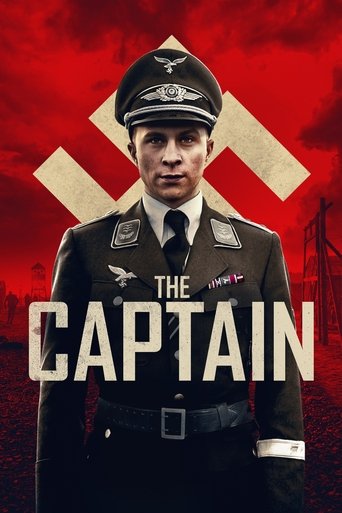Basado en la historia real del verdugo de Emsland.
"Der Hauptmann" (2018), a gripping cinematic portrayal of the harrowing final days of World War II, is a film that delves deep into the psyche of its protagonist, Willi Herold, a young German soldier who stumbles upon an abandoned captain's uniform. Directed by Robert Schwentke and produced by Hands-on Producers and Filmgalerie 451 in collaboration between Germany and France, the film masterfully explores themes of power, identity, and the moral abyss into which ordinary individuals can descend under the guise of authority. Max Hubacher's chilling performance as Herold captures the transformation from a desperate deserter to a ruthless imposter who commands a squad of soldiers, leading them on a brutal path of violence and retribution. The film's stark black-and-white cinematography not only evokes the period's grim atmosphere but also serves as a metaphor for the moral ambiguity that pervades the narrative. As Herold dons the captain's uniform, he is thrust into a world where the lines between right and wrong blur, and the allure of power becomes intoxicating. Schwentke's direction is unflinching, presenting a raw and unfiltered look at the atrocities committed under the Nazi regime, while also questioning the nature of obedience and complicity. The supporting cast, including Milan Peschel and Frederick Lau, deliver compelling performances that add depth to the ensemble, highlighting the varied responses to Herold's assumed authority. "Der Hauptmann" stands out for its historical accuracy and its willingness to confront uncomfortable truths about human nature. The film is based on the true story of Willi Herold, whose real-life actions during the war were as shocking as they were tragic. Schwentke's adaptation does not shy away from depicting the brutal realities of war and the ease with which individuals can be corrupted by power. The film's narrative is a cautionary tale, reminding viewers of the dangers of unchecked authority and the importance of moral integrity in the face of chaos. In conclusion, "Der Hauptmann" is a powerful and thought-provoking film that offers a unique perspective on the final days of World War II. Through its intense storytelling and compelling performances, it challenges audiences to reflect on the nature of power and the human capacity for both cruelty and redemption. Produced by Hands-on Producers and Filmgalerie 451, this German-French collaboration is a testament to the enduring relevance of historical narratives and their ability to shed light on the darkest aspects of humanity.
Año2018
Página principal
Duración118 minuto
GénerosBélicaDramaHistoria
Países de producciónGermanyFrancePoland



